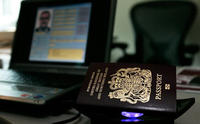-
BIO-key shows mobile biometric identification and authentication platform
BIO-key believes that the world now is a place with 24/7 access to information from mobile devices; application providers and enterprise IT professionals have been struggling with how they can quickly, conveniently, and accurately establish the identity of remote users looking to access their sites and applications; the company offers a mobile fingerprint identification solution
-
-
U.S. Army in $7.9 million contracts for biometrics help
Virginia-based Stanley has been awarded two contracts worth $7.9 million to support of the U.S. Army Intelligence Center Language Technology Office at Fort Huachuca, Arizona; Stanley will provide expertise for a range of programs related to the development of biometric and forensic-related applications, management, maintenance, and operation of government-owned network equipment
-
-
U.K. Border Agency approves Pearson's test security methods
Students who want to study in the United Kingdom must prove their proficiency in English before being granted a student visa; Pearson, the authors of the Pearson Test of English Academic (PTE Academic), relies on multiple layers of biometrics — palm vein scanning, digital signatures, and test day digital photographs of applicants — to ensure that those who take the test are who they say they are
-
-
New explosives detection technologies show promise
An adversary who is willing to die trying to carry out a mission is one of the reasons why more conventional security organizations find it so difficult to pursue their protection mission effectively in an asymmetrical war — the kind of war terrorists engage in; new explosive detection technologies may be of help
-
-
India may block BlackBerry over security concerns
India told RIM that BlackBerry services in India would be banned unless the company agreed to set up a proxy server in the country to enable security agencies to monitor e-mail traffic; Pakistan has already banned some BlackBerry services, including blocking Internet browsers on BlackBerry handsets because of concerns over blasphemy, and UAE is considering a similar measure
-
-
New cybersecurity threat: smartphone apps that do more than what they say they do
A large proportion of applications contain third-party code with the capability to interact with sensitive data in a way that may not be apparent to users or developers; Apple reviews its applications before accepting them into its App Store, but even that is not foolproof when it comes to detecting erroneous or malicious components within apps, which might end up collecting or storing information that has nothing to do with the intended usage case of the app
-
-
X Prize to offer millions for Gulf oil cleanup solution
The X Prize Foundation will tomorrow launch its Oil Cleanup X Challenge promising millions of dollars for winning ways to clean up crude oil from the BP spill in the Gulf of Mexico; past X Prize categories include mapping genomes, making an incredibly fuel efficient car, and exploring the moon’s surface with a robotic vehicle
-
-
Radiation concerns dog full-body scanners
By the end of 2014, TSA will install between 1,950 and 2,200 full-body scanners at checkpoints in all 450 commercial airports in the United States; TSA buys scanners which use two technologies — backscatter X-ray and millimeter wave; since backscatter technology raises persistent worries about radiation, some want to know why TSA should not buy only millimeter-wave scanners
-
-
U.S. Army to buy additional explosive disposal robots
Boeing, iRobot receive a follow-on order for 94 additional explosive disposal ground robots, bringing to total number of robots the U.S. Army has ordered to 323; the robot has the ability to perform reconnaissance during extremely hazardous explosive disposal missions involving unexploded ordnance and improvised explosive devices
-
-
Siemens: Removing SCADA trojan may disrupt power plants
Siemens last Thursday made available to customers a tool which would detect and remove a Trojan worm infecting the company software — software used in controlling and monitoring U.S. critical infrastructure facilities and other industrial processes; trouble is, the use of the company warned customers that using the program could disrupt sensitive plant operations
-
-
BP accused of trying to buy the silence of scientists on spill

BP is accused of trying to buy the silence of leading scientists: the company offering scientists and researchers lucrative contracts to participate in developing restoration plan for the Gulf after the oil spill — but: the scientists are not allowed to publish the research they do for the oil giant; they are also not allowed to speak about the data for at least three years or until the government gives final approval for the company’s restoration plan for the whole of the Gulf; the company would not allow scientists to take total control of the data or the freedom to make those data available to other scientists and subject to peer review; in the case of the University of South Alabama, BP offered to sign up the entire marine sciences department
-
-
Dell to replace server parts infected with virus
Dell says W32.Spybot worm was found in replacement motherboards, and that it will replace infected parts with clean motherboards; the company says it is unaware of any attacks as result of infections
-
-
The revival of CLEAR's Registered Traveler program
In 2003, Steven Brill, founder of Court TV and American Lawyer magazine, founded Verified Identity Pass and used it to launch the CLEAR program at Orlando International Airport; the program made it possible for pre-registered travelers to skip security checks at airports; the initial 8,000 travelers enrolled in 2003, and the service would grow to nearly 260,000 paying customers in a matter of five years; CLEAR went belly up in 2009, and its assets were bought by Algood Holdings, which relaunched the program; “Same brand, same logo, different company,” says CEO Caryn Seidman Becker
-
-
U.K. removes lead contractor Raytheon from e-Borders program

The U.K. hits out at Raytheon, removing the company from the £1.2 billion e-Borders program; the immigration minister Damian Green said earlier today that the program was running at least twelve months late and that Raytheon had been in breach of contract since July last year; Home Office says it has “no confidence” in the company; Raytheon was the lead contractor of the Trusted Borders consortium, which won a £650 million deal in 2007 to build the e-Borders system; other members of the consortium, including Serco, Detica, Accenture, and Qinetiq will keep their contracts; Raytheon was responsible for systems integration, travel services, and overall project management
-
-
Dell warns of hardware trojan
Computer maker Dell is warning that some of its server motherboards have been delivered to customers carrying an unwanted extra: computer malware; it could be confirmation that the “hardware trojans” long posited by some security experts are indeed a real threat; the Pentagon is spending millions on research designed to ensure it can trust the microchips in critical systems, especially those made outside the United States
-
- All
- Regional
- Water
- Biometrics
- Borders/Immig
- Business
- Cybersecurity
- Detection
- Disasters
- Government
- Infrastructure
- International
- Public health
- Public Safety
- Communication interoperabillity
- Emergency services
- Emergency medical services
- Fire
- First response
- IEDs
- Law Enforcement
- Law Enforcement Technology
- Military technology
- Nonlethal weapons
- Nuclear weapons
- Personal protection equipment
- Police
- Notification /alert systems
- Situational awareness
- Weapons systems
- Sci-Tech
- Sector Reports
- Surveillance
- Transportation
Advertising & Marketing: advertise@newswirepubs.com
Editorial: editor@newswirepubs.com
General: info@newswirepubs.com
2010-2011 © News Wire Publications, LLC News Wire Publications, LLC
220 Old Country Road | Suite 200 | Mineola | New York | 11501
Permissions and Policies
Editorial: editor@newswirepubs.com
General: info@newswirepubs.com
2010-2011 © News Wire Publications, LLC News Wire Publications, LLC
220 Old Country Road | Suite 200 | Mineola | New York | 11501
Permissions and Policies
